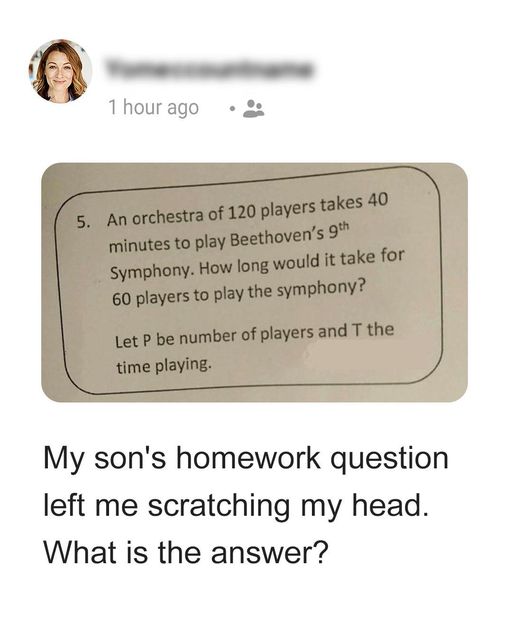Parents often find themselves scratching their heads over their kids’ homework assignments, sometimes needing a little extra help. Fortunately, in today’s digital age, they can turn to Reddit, Twitter, and other online communities to share and solve some of the most puzzling questions. Here are seven real examples of kids’ homework that left adults stumped and sparked discussions online.

1. First-Grade English Mystery
One mom was left confused by her first-grader’s English homework. Her child was asked to circle images that had the same ending sound as the word “fin.” The choices, however, didn’t make things easy: a hamburger bun, a frog, a jar lid, and a spoon.
Other parents on Reddit came to her aid, suggesting that the ending sound didn’t necessarily need to rhyme with “fin” but should simply share the same ending sound. The consensus? “Bun” and “spoon” were likely the correct answers, as both end in the “n” sound, though the assignment sparked a fair bit of debate among users.
2. Kindergarten Word Challenge
Kindergarten homework is generally pretty straightforward, but one parent was completely stumped when a three-letter word was required to describe an image of a rabbit and her baby bunnies.
After some back-and-forth, a helpful Reddit user suggested the word “pet,” explaining that these worksheets sometimes challenge kids by making them consider different letter sounds within the word. This answer helped make sense of the worksheet, which often plays with sounds to build kids’ early phonetic skills.
3. Third-Grade Math Riddle
Math for third-graders usually involves basic calculations, but one question left both students and parents scratching their heads. The question read, “Janell had 15 marbles. She lost some of them. How many does Janell have now?”
While some users suggested a simple answer like “less than 15,” others found the wording unfairly vague. One Redditor humorously suggested the student respond with, “Janell lost her marbles,” while another said, “She has some left.” This problem sparked a conversation about how math questions often expect young students to infer missing information—a challenge for any third-grader!
4. The Paint Splatter Riddle
One mom was left stumped by her six-year-old’s homework, which presented an image of a paint splatter alongside several apples. The question asked, “How many apples could be covered by the paint? There cannot be more than 20.”
Reddit users weighed in, with some suggesting it might be a riddle rather than a math question. A few users thought the problem was testing spatial reasoning, while others felt it was intentionally misleading. In the end, no one was quite certain what the “correct” answer was, highlighting how visual questions can sometimes baffle both kids and parents alike.
5. Singapore Math for First-Graders
One math question from a Singaporean first-grade assignment had a Twitter user sharing their confusion. Known for its rigorous approach, Singapore math has often stumped parents worldwide. This particular question was a logic problem, and even adults found it tough to solve.
One Twitter user eventually figured out the answer by tweaking the question slightly, but the question raised concerns over the complexity of problems that some schools assign to young children. Many commenters felt the problem’s difficulty level was a bit extreme for first graders.
6. A Confounding Math Question on Perimeters
Another math problem, shared on Twitter, asked students to calculate the perimeter of a shape by using measurements from a separate rectilinear shape. The question left people scratching their heads, with one Twitter user joking, “It’s very much justified to ask this of a [ten-year-old].”
The response underlined how questions that require understanding of abstract reasoning can feel overly complex for kids at the elementary level. Despite its difficulty, some users managed to provide answers, albeit with lengthy explanations that felt more suitable for high school students than ten-year-olds.
7. Solving for X with Beethoven’s Symphony
Some math questions can be overly theoretical, and this one—based on Beethoven’s 9th Symphony—had Twitter users shaking their heads. The question read, “An orchestra of 120 players takes 40 minutes to play Beethoven’s 9th Symphony. How long would it take for 60 players to play the symphony? Let P be the number of players and T the time playing.”
One Twitter user, who also happened to be a musician, responded, “The math is irrelevant in the case of this Beethoven problem. As a performer who has done it many times, the speed of the symphony is NOT a function of the number of musicians performing it.” This response pointed out that the question ignored basic principles of music, highlighting how questions that mix different concepts can often lead to more confusion than clarity.
Why Parents Are Turning to Online Communities for Help
As these examples show, homework isn’t always straightforward. Modern curricula often emphasize critical thinking and problem-solving, which means that some questions are designed to be challenging and make kids think in new ways. However, as these parents discovered, the complexity of some assignments can sometimes push beyond what’s reasonable, leaving even adults puzzled.
Thanks to online communities like Reddit and Twitter, parents have a place to turn when they’re stumped. These platforms provide a space for sharing knowledge, offering both practical advice and some much-needed humor in the face of confusing homework assignments. Parents who struggle with tricky questions can find quick assistance, and the discussions often reveal the creativity and diverse perspectives people bring to problem-solving.
At the end of the day, the goal of challenging assignments is to help kids develop critical thinking skills, but questions that leave adults as confused as their kids might be an indication that some assignments are too complex. For now, parents can at least rely on the collective wisdom of the internet to make sense of these tricky questions—until the next baffling homework assignment arrives.


